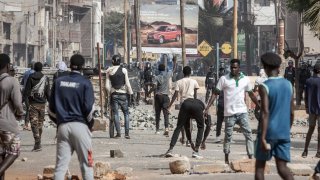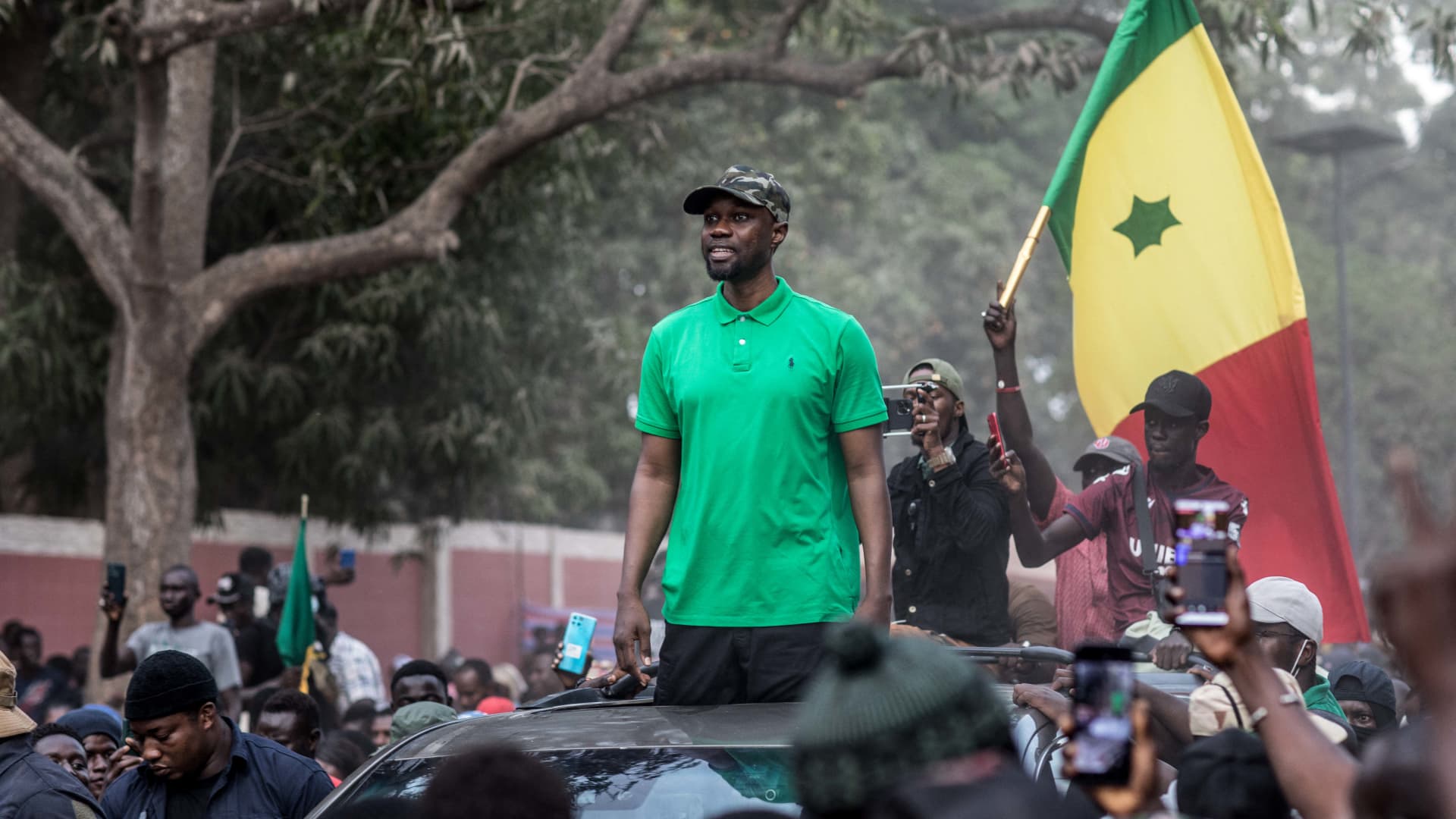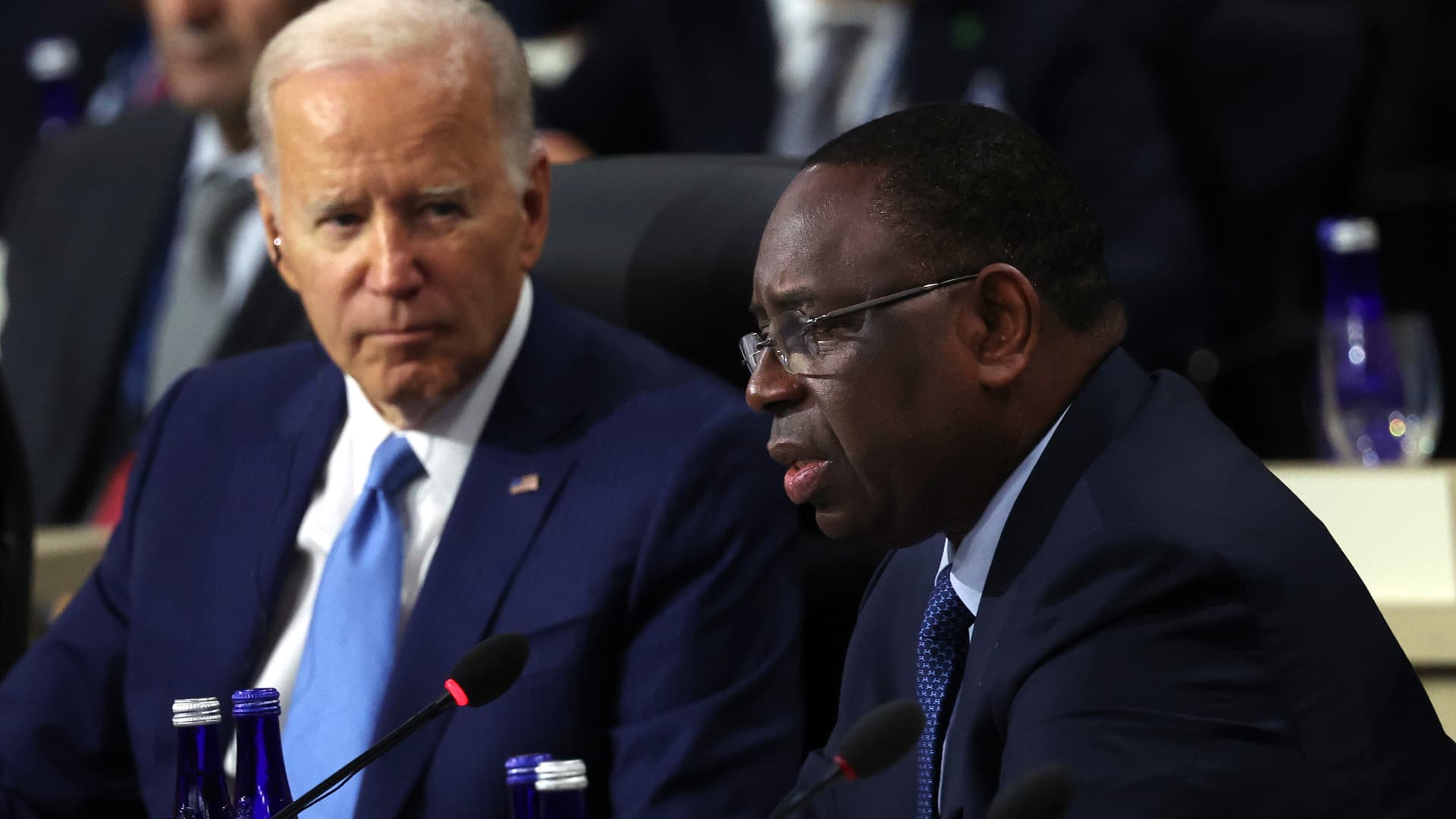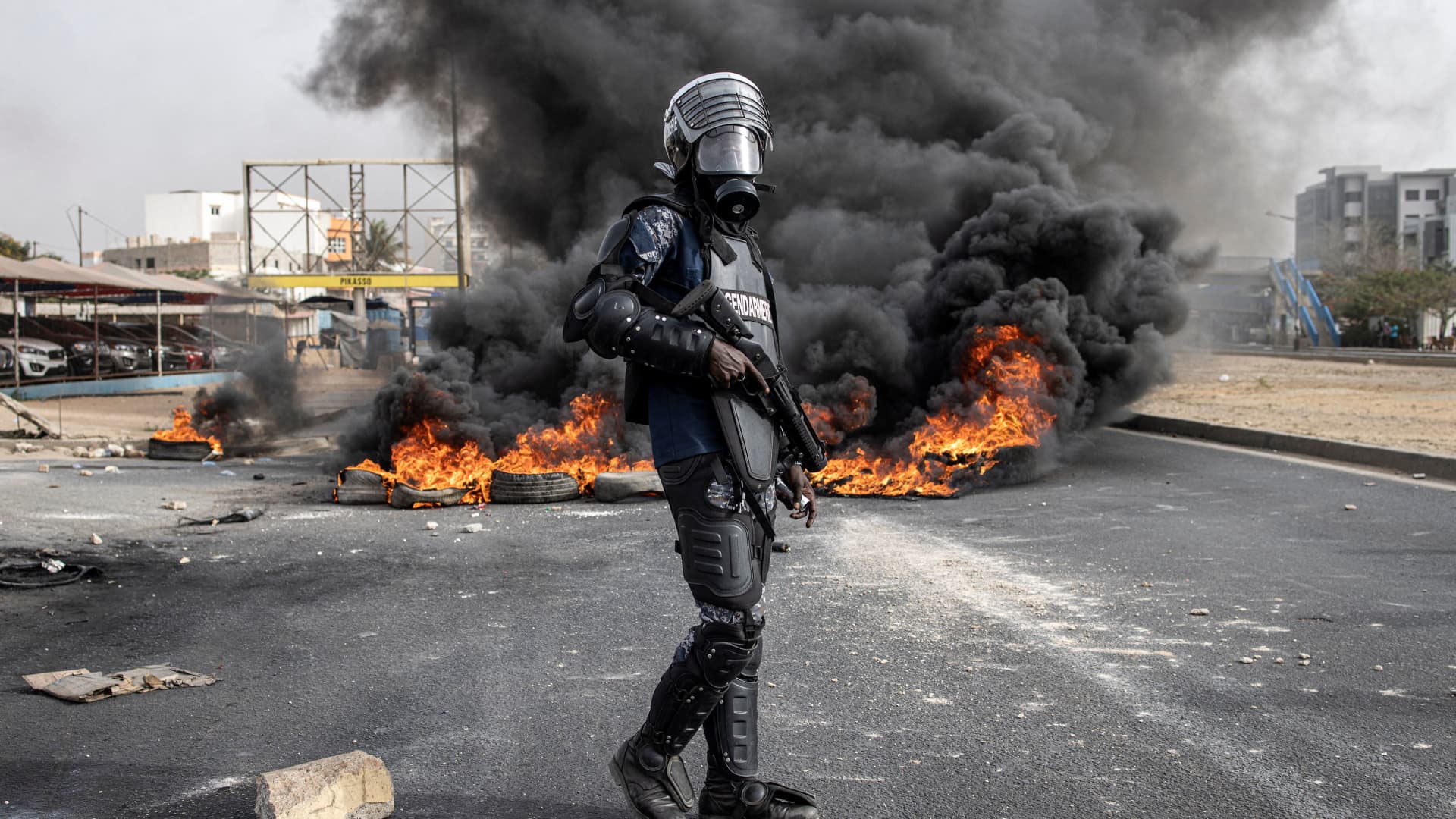
- Days of violent clashes erupted late last week between security forces and supporters of Ousmane Sonko, the 2024 presidential candidate and leader of the opposition PASTEF party sentenced in absentia on Thursday to two years in prison for "corrupting the youth."
- As of Monday, at least 16 people had reportedly been killed and hundreds of others injured, while police had arrested around 500 people across several cities.
- The unrest is the worst seen for decades in a country often held up as a beacon for democracy and stability in the region.
The criminal conviction of a populist opposition leader in Senegal has triggered widespread unrest that threatens the West African country's long-established political stability.
Days of violent clashes erupted late last week between security forces and supporters of Ousmane Sonko, the 2024 presidential candidate and leader of the opposition PASTEF party sentenced in absentia on Thursday to two years in prison for "corrupting the youth." He was acquitted on an accompanying rape charge.
As of Monday, at least 16 people had reportedly been killed and hundreds of others were injured, while police had arrested around 500 people across several cities. Internet and social media access was restricted, and roadblocks were erected on key transport routes.
Get top local stories in Connecticut delivered to you every morning. >Sign up for NBC Connecticut's News Headlines newsletter.
"The recent deaths and injuries of protesters set a worrying tone for the 2024 presidential elections and should be thoroughly investigated, with those responsible held accountable," said Carine Kaneza Nantulya, deputy Africa director at Human Rights Watch.
"The authorities should end the repression against protesters and critics, and guarantee freedom of assembly."
This condemnation and call for restraint were echoed in recent days by the spokesperson for United Nations Secretary-General Antonio Guterres, by the regional bloc of the Economic Community of West African States (ECOWAS) and by African Union Commission Chairman Moussa Faki Mahamat.
Money Report
"The Senegalese authorities should end the arbitrary arrests, release those wrongfully held, including children, and respect the rights of Senegalese people to peacefully demonstrate and protest," said Kaneza Nantulya.
"The African Union and ECOWAS should use their influence to press Senegalese authorities to end their repression of protests and critics."
The unrest comes after a turbulent couple of years and is the worst seen for decades in a country often held up as a beacon for democracy and stability in the region.
Triggers for unrest
Sonko has staunchly maintained that the multiple criminal cases brought against him in recent years are politically motivated and part of an effort by President Macky Sall's government to derail his 2024 candidacy. The conviction could bar him from running.
He was first indicted on rape charges in March 2021 and faces separate defamation charges. His various trial dates over the last two years have often been accompanied by flare-ups of violence from supporters.
Broader tensions among the public were already simmering of late, amid speculation that Sall will seek a third term in office despite the country's two-term limit and his rapidly deteriorating popularity since the last election in 2019.
The underlying roots of the unrest are both political and socio-economic, according to analysts at African specialist intelligence company Pangea-Risk. Consumer price inflation has slowed since late 2022, but hovers at around 9%, with food prices up more than 11% year-on-year.
"Transportation costs, rents, electricity tariffs, and fuel prices are also still unaffordable for many Senegalese. Even while the country's economy has been growing at record rates on the back of sizable investments in extractive sectors and infrastructure projects, including both renewable and gas-fired power plants, living conditions for many people have not noticeably improved," Pangea-Risk said.

"Many young residents in cities feel socio-economically marginalised and are increasingly frustrated by a government that they say is led by aging and distant leaders, who have been too slow to soften the economic blow from the pandemic and the impact of the war in Ukraine."
It is this demographic that has gravitated towards Sonko, a former tax inspector and whistleblower who rose to prominence by exposing offshore tax havens used by members of the Senegalese elite. He founded PASTEF in 2014.
After the failure of his first presidential bid in 2019, he was elected mayor of the southern city of Ziguinchor in 2022. He has since established a strong base in the south of the country and among socio-economically disillusioned voters in cities and industrial regions.
Sonko has fanned the flames of recent protests, with PASTEF issuing a statement Thursday urging citizens to "stop all activity and take to the streets." Last month, he initiated a procession for his motorcade between Zinguinchor and Dakar, encouraging protestors to join him.
Whether police plan to detain Sonko imminently to commence his prison sentence remains unclear, though such a move would likely throw fuel on the fire of recent tensions. From apparent house arrest, Sonko has advocated for a "national resistance movement" to defend civil liberties.
A critical election
If last week's conviction sticks, Sonko could follow other opposition leaders such as Khalifa Sall (unrelated to the president) and Karim Wade, both of whom were convicted on charges of fraudulent use of funds ahead of the 2019 election and barred from running.
Some commentators have speculated that, in order to split the opposition vote in the 2024 election, President Sall may grant amnesty to some previously-disqualified political leaders, after the government's apparent suppression galvanized opposition parties in recent years.

Pangea-Risk suggested in its Monday report that, as the 2024 election approaches, the threat of civil unrest will increase and be exacerbated by Sall's government's efforts to curtail opposition and freedom of expression.
Although recent violence appears to have been contained by internet restrictions and the mass deployment of the military, they added that "widespread incidents of unrest" in major urban centers are likely in the event of Sonko's physical arrest, or of Sall's announcement that he will run as the ruling APR's candidate for a third term in office.
"A popular backlash to [Sall's] power extension ambitions could scupper relations with international investment partners, foreign donors, and the IMF, whose support is needed to maintain fiscal stability, finance subsidies, and service debts," Pangea-Risk said.
Economic prospects
Senegal's medium-term economic growth prospects have improved on the back of a massive influx of new hydrocarbon investments, with several major liquefied natural gas (LNG) and crude oil projects due to come online later this year.
"In the short-term, debt sustainability will remain a primary concern as costly energy subsidies place the public budget under sustained pressure," the report projected.
"The government is unlikely to heed IMF advice to cut subsidies and is instead ramping up spending on socio-economic relief that is aimed at boosting its appeal ahead of the 2024 elections."

The IMF and Senegalese authorities agreed last month on a new 36-month financing arrangement of around $1.526 billion under the institution's Extended Fund Facility and Extended Credit Facility, combined with a Resilience and Sustainability Facility of $327.1 million.
Associated policy requirements include a fiscal consolidation, strengthened governance and a framework for anti-money laundering and terrorism financing measures, along with delivering "more inclusive and job-rich growth," the IMF's mission to Dakar recorded last month.
The D.C.-based organization projected that non-hydrocarbon GDP growth in Senegal will hit 5.3% in 2023, down from an initial forecast of 6%. Total GDP growth could exceed 8% this year, should the aforementioned oil and gas production begin in the fourth quarter.
Government debt is also expected to drop from 75% of GDP in 2022 to more sustainable levels in the coming years. The country's debt position is widely considered stable, with the outlook viewed as sustainable due to the new hydrocarbon revenues due onstream from later this year.






